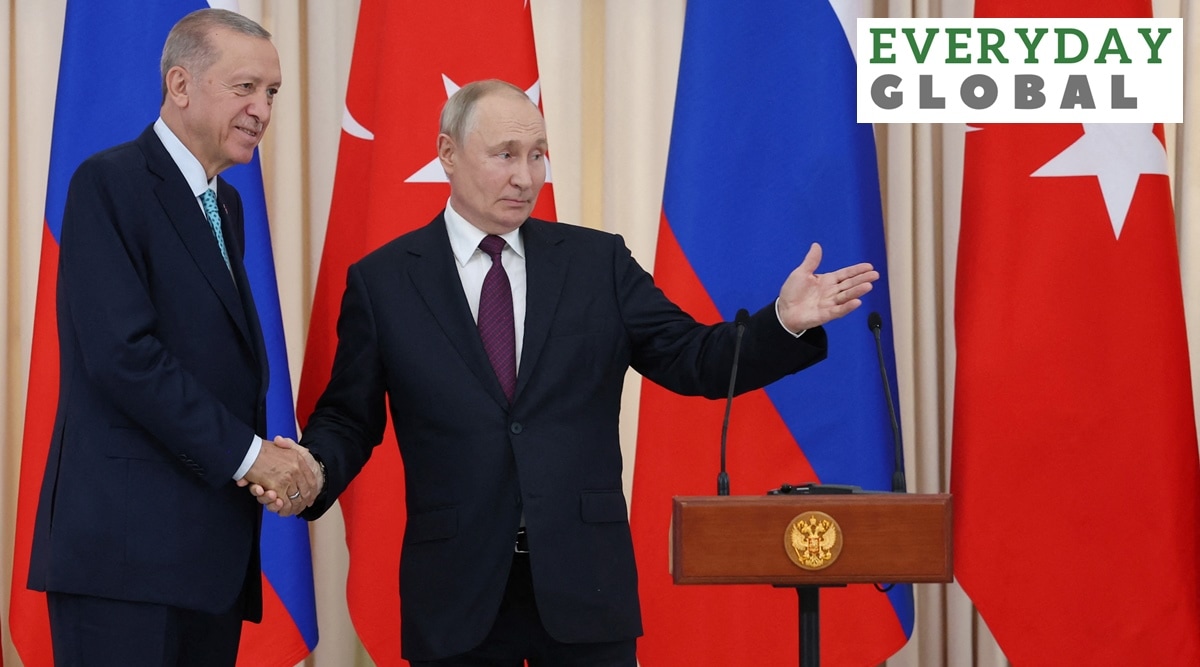Black grain deal will be restored ‘soon’, says Turkey’s Erdogan: What is the agreement; its significance
Russian President Vladimir Putin, however, said the deal will not be revived until the West meets its obligations to facilitate Russian agricultural exports.

Turkish President Tayyip Erdogan on Monday (September 4) said he was confident Russia would “soon” revive the Black Sea grain deal, which was signed in July 2022 and assured safe passage to ships carrying grain from Ukraine. In July this year, Russia refused to extend the deal.
Since then, Turkey has repeatedly pledged to renew it to help avoid a food crisis in parts of Africa, the Middle East and Asia. Russia’s President Vladimir Putin, however, said the deal will not be restored until the West meets its obligations to facilitate Russian agricultural exports. The comments came after they held talks on Monday at the Russian Black Sea resort of Sochi.
What is the Black Sea grain deal, why is it important, and why has Russia withdrawn from it? We explain.
What is the Black Sea grain deal?
Ukraine is among the world’s biggest exporters of food grains, such as wheat and corn, and a major contributor to the UN’s food aid programmes. After Russia attacked the country and blockaded its ports, it sent food prices soaring and raised fears of food security in the poorer nations of the world. For example, Pakistan witnessed wheat prices skyrocket to crisis levels.
To tackle the situation, the UN and Turkey, on July 22, 2022, got Russia to agree to the Black Sea Grain Initiative, under which cargo ships would be allowed to travel from and to three Ukrainian ports of Odesa, Chornomorsk and Pivdennyi (Yuzhny), after inspection that they weren’t carrying arms. The safe passage in the Black Sea was 310 nautical miles long and three nautical miles wide. The deal was extended twice before Russia withdrew from it.
Why did Russia refuse to renew it?
Russia has continued to claim that the promises made to it under the deal have not been met and that it is facing trouble exporting its own agricultural products and fertilisers because of the many sanctions the West has slapped on it.
While there is no direct restriction on Russia’s agricultural products, the country says barriers on payment platforms, insurance, shipping and other logistics are hampering its exports.
“We have repeatedly shown goodwill to extend this deal,” Putin told reporters on July 13, as quoted by AP. “Enough is enough.”
Russia has also said it had agreed to the grain deal in order to help ensure global food security, but Ukraine has since exported mainly to high-and middle-income countries. The UN has pointed out that while this is true, poorer countries have been helped by food prices cooling down.
What has happened since the deal came to an end?
Since its refusal to extend the end, Moscow has repeatedly attacked the Odesa region, which is Ukraine’s main Black Sea port. On Monday, a Russian drone strike targeted the Danube River port of Izmail in Odesa, damaging warehouses and buildings, according to the Ukrainian Air Force. The attack took place just hours before Putin and Erdogan met.
Russia is also looking to export grain to African nations. Putin said Moscow was close to a deal with six African countries over a plan to supply Burkina Faso, Zimbabwe, Mali, Somalia, the Central African Republic and Eritrea with up to 50,000 tonnes of grain, Al Jazeera reported on Monday. Russia would supply the food and carry out logistics at no cost, and deliveries “would begin in the next couple of weeks,” the Russian president added.